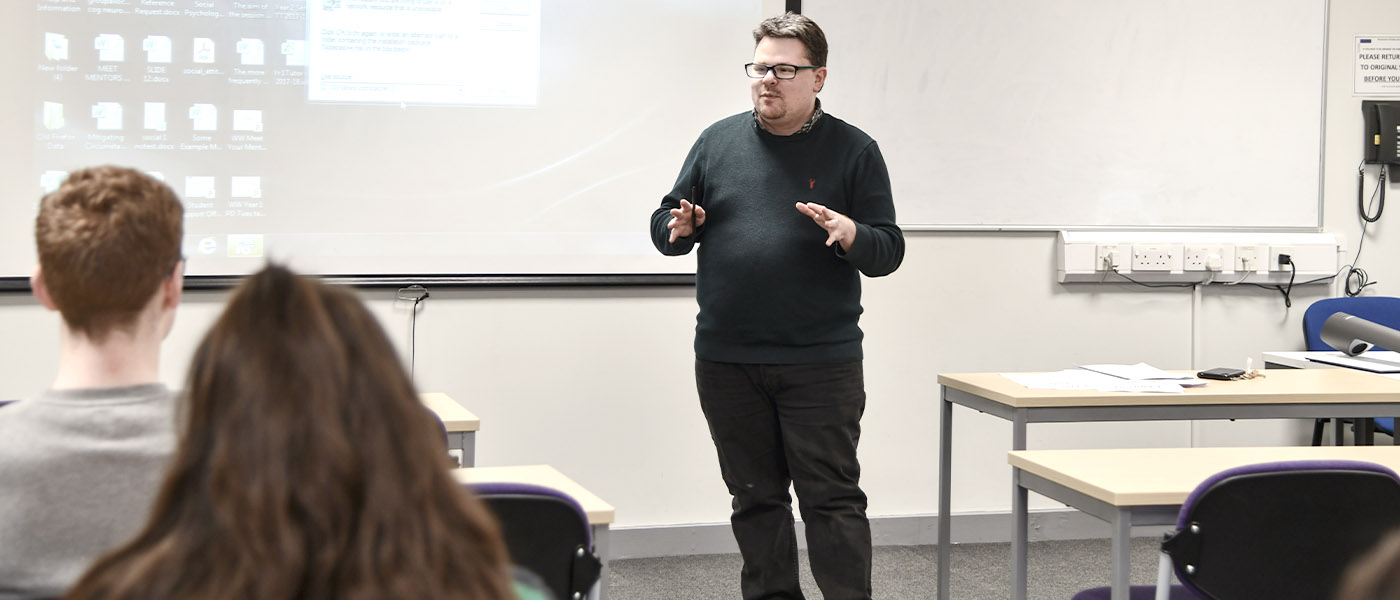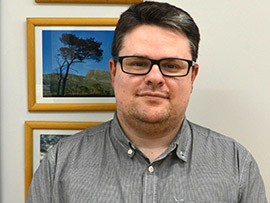From student to teacher
University can feel like a big place for new students but people like Dr Doron Cohen, lecturer and first year lead for BSc Psychology, help to make the big pond feel smaller. His time at Manchester has seen him go from undergraduate to researcher to teacher, and his current work explores mental health in psychology students.

“I love the sense of learning that is everywhere in the university,” Doron said, when asked on why he’s stayed at the university for more than two decades.
“Whether or not you’re a researcher, or a lecturer, whether you’re doing both, there’s just this sense that there’s lots of things to explore and discover and find out.”
Doron graduated with a psychology degree from The University of Manchester in 2004, coming joint third in his year. He then stayed on in the department as a teaching assistant, before starting his PhD.
His research on non-verbal behaviour in deception went on to be published and he won the Mouton D’Or, an annual peer nominated prize for the best paper published in the journal Semiotica in 2010, as well as the Sue Fielder Memorial Prize for most outstanding doctoral thesis in his cohort.
“I didn’t know what I wanted to do at the end of my degree, but knew I didn’t want to leave the University so I applied for a teaching assistant post… suddenly I went from being a student to working with staff that I admired ”

Dr Doron Cohen
Students at the heart
Doron’s current main focus is teaching, where he also brings his research interests and experience. In 2018, he was recognised for his innovative teaching syllabus with the 21st Century Curriculum Creator Teaching Award.
“One of the things I try to do is light a spark of interest in a particular topic. That award recognises stuff that I’ve done around trying to embed sustainability into the undergraduate psychology programme, and also the lab class that I run in first year on Brexit.”
He uses current real world issues to get students to think about the mechanisms of researching implicit attitudes, the attitudes that we aren’t necessarily aware of.
“What I hope I do is genuinely engage the students enough to go and do the reading and think ‘Oh that’s an interesting idea, I want to go and find out more’. That’s always been central to my teaching philosophy.”
Doron’s dedication to teaching proves that making an impact at a research university doesn’t always have to be through research, despite the fact he never saw himself going into teaching at first.
“I actually didn’t know what I wanted to do at the end of my degree but knew that I didn’t want to leave the University, so I applied for a teaching assistant post here in the same department,” Doron said.
“Suddenly I went from being this student to working with staff that, in many ways, I admired and thought were fantastic. That was my first experience of teaching.”
It seems Doron has a certain knack for teaching, having gone on to secure a permanent lecturer position after his postdoctoral research and winning several awards for his teaching contributions. In 2017 he was voted Best Lecturer in the Faculty of Biology, Medicine and Health.
“That is probably the achievement I’m most proud of. There are incredible lecturers, both within psychology and across the Faculty, who are gifted communicators, who give up huge amounts of time to support students. To be recognised among that group of people is wonderful – let alone to actually go on to win it.”

Mental health champion
It’s clear that what really inspires Doron is his love of teaching, building relationships with his students and supporting their development throughout their degree.
“One of the things I really enjoy about my role is that I’m kind of cradle to grave, in the sense that I see students on day one when I welcome them to the University.”
“Then I see them in Years 2 and 3, so at graduation I am perhaps the one that has known those students for the longest period. I get that pleasure of seeing them achieve their goals and watching them develop over time. That for me is certainly the role I most enjoy and connect with.”
This is something that’s clear to his students too, having received a Student Choice Award in 2015 for making the biggest difference to their time at university.
“As somebody who sees lots and lots of students from across all three years, I’m aware that student mental health isn’t always as good as it should be.”
There is growing literature to suggest that mental health in the student population is worse than the general population.
“If you take a 17 or 18 year old who’s a student and compare them to a 17 or 18 year old who’s a non-student, their mental health tends to be slightly worse. There’s a national debate going on around student mental health and what we can do to support it,” Doron explained.
“I’ve recently written and submitted a paper around trying to understand what it might like to be a psychology student with poor mental health, how you make sense of your mental health in the context of your growing knowledge of the treatment options and the causes of mental distress.”
He is also supervising masters’ students looking into the prevalence and types of mental health difficulties of students across eight different disciplines. Doron hopes that this will shed more light onto how to support students better.

Making a difference
“To teach effectively you need to be able to build a relationship with students in the room and that can be very challenging in large lecture theatres, but I think that it is absolutely achievable,” Doron said.
“I’ve always been somebody who has never really had a very concrete plan of what I want to do, I’m much more motivated by making a changes to people’s lives.”
This philosophy is what leads Doron to get involved with numerous sides of student support.
“I am always looking for new challenges, I don’t like to be too comfortable in a role, as much as I enjoy my current role as Year 1 Lead, I have other roles as well.”
Doron is the staff lead for the peer mentor scheme, an initiative that aims to provide peer-to-peer support for first year students. He also does some work with the University’s widening participation initiatives, which aim to ensure that there are no barriers to studying at the University.
“That’s something else I find very meaningful to do and to engage with. I’d like to just continue to make a difference to anybody who crosses my path.”
Find out more about studying psychology at The University of Manchester.
